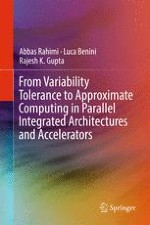2017 | OriginalPaper | Buchkapitel
10. An Approximation Workflow for Exploiting Data-Level Parallelism in FPGA Acceleration
verfasst von : Abbas Rahimi, Luca Benini, Rajesh K. Gupta
Erschienen in: From Variability Tolerance to Approximate Computing in Parallel Integrated Architectures and Accelerators
Aktivieren Sie unsere intelligente Suche, um passende Fachinhalte oder Patente zu finden.
Wählen Sie Textabschnitte aus um mit Künstlicher Intelligenz passenden Patente zu finden. powered by
Markieren Sie Textabschnitte, um KI-gestützt weitere passende Inhalte zu finden. powered by
